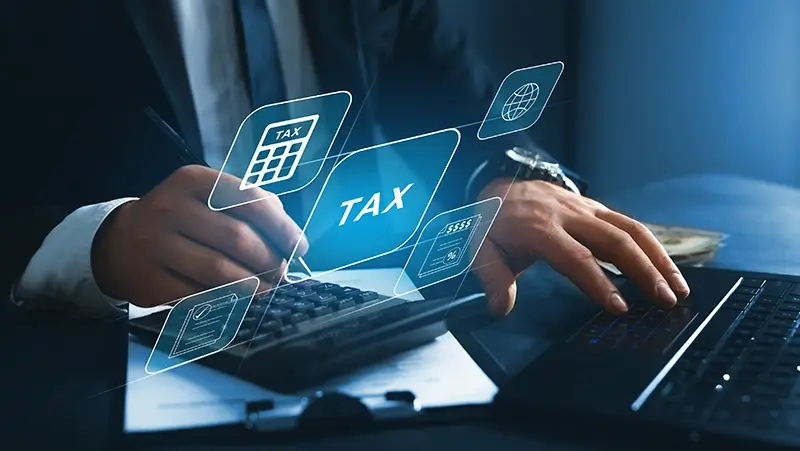Business Income Tax Preparation - Complete Guide
For entrepreneurs, grasping and adeptly handling business taxes is vital. This detailed guide delves into the complexities of tax preparation,...
Tax season is often overwhelming for small business owners. Navigating intricate tax laws, evolving regulations, and the possibility of an audit requires precise and efficient tax preparation. This guide will detail the fundamentals of business tax preparation, covering everything from recognizing various taxes and required documentation to selecting suitable tax software and collaborating with tax experts. Discover how to manage tax affairs and simplify tax season for your small business.
Business tax preparation requires an understanding of the basics, including necessary documents and the role of professional tax preparers.
Accurate preparation is essential for businesses to remain compliant, take advantage of deductions/credits, and avoid potential fines/penalties.
It is important to compare software options based on features & costs. Working with a qualified professional can help optimize savings & ensure compliance.
| Index |

Navigating the complexities of taxes is challenging for business owners, yet grasping the fundamentals is crucial for compliance and optimizing deductions. Accurate tax preparation is vital to adhere to tax laws and regulations and to fully benefit from all deductions and credits. Business taxes can encompass income taxes, payroll taxes, and sales taxes, among others. Handling these taxes requires various documents, including income and expense records, financial statements, receipts, invoices, and records of asset purchases and disposals for thorough business tax preparation.
Tax preparers are integral to the tax preparation process. They are tasked with preparing, filing, and assisting with general tax forms, and they offer support to taxpayers in interactions with the IRS. Every paid tax preparer must clear a suitability check and secure a PTIN (Preparer Tax Identification Number). The distinction between tax preparers with unlimited representation rights and those with limited rights is their capacity to represent clients in tax issues. Tax preparers with unlimited representation rights, such as enrolled agents, CPAs, or attorneys, are authorized to represent clients in audits, appeals, and payment or collection matters, whereas those without these credentials possess limited practice rights.
Importance of accurate tax preparation
One of the primary reasons is to ensure that businesses accurately record payroll and associated tax expenses in their accounts. Accurate tax preparation also aids in compliance with tax laws and regulations, helping businesses avoid fines, penalties, and the risk of suspension or administrative dissolution.
Moreover, meticulous tax preparation enables businesses to maximize all possible deductions and credits, which can lead to significant tax savings. There are numerous resources available for learning about tax preparation, including educational courses, professional tax advisors, and specialized software.
Several types of taxes apply to businesses, including income tax, self-employment tax, payroll tax, and sales tax. Depreciation schedules are utilized to compute the depreciation on assets that a business has at the start of the tax year.
Upon approval from the IRS as an Authorized e-file provider, businesses will receive an acceptance letter with the assigned EFIN (Electronic Filing Identification Number). In some states, tax preparers may be required to submit a separate application for state income tax return e-filings.
Self-employment taxes for small business owners pertain to the taxes that individuals running their own businesses are obligated to pay on their earnings. As a small business owner, you're deemed self-employed, making you responsible for both the employer and employee shares of certain taxes. The self-employment tax is mainly composed of Medicare and Social Security taxes, known together as Federal Insurance Contributions Act (FICA) taxes. You must pay both the employer's and employee's share of these FICA taxes, which in traditional employment settings are divided between the employer and the employee. Your self-employment tax is determined by your net self-employment income, which is your gross business revenue less any allowable deductions.

Financial statements, receipts and invoices, and asset purchase and disposal records are essential for business tax preparation. These documents provide a comprehensive view of a business's financial health and enable tax preparers to accurately report income and expenses on tax returns.
Bank statements are pivotal in business tax preparation as they offer insight into income and expenditure activity for the year. Credit card statements can be beneficial for entrepreneurs when determining day-to-day expenditures such as gas, parking, meals, supplies, equipment, and other items, which can be pertinent when computing write-offs during tax season.
Financial statements are crucial for tax preparation as they provide a snapshot of a business's financial position. To file a business tax return, a copy of the balance sheet, income statement, and general ledger must be provided to the tax preparer.
In addition to these financial statements, the tax preparer may also require income and expense records, asset and loan information, inventory total, financial business reports from the year, the preceding year's tax return, payroll data, any stock or bond information, as well as the EIN or SSN number.
These documents help tax preparers accurately report a business's income and expenses, ultimately ensuring compliance with tax laws.
Maintaining accurate records of receipts and invoices is essential for businesses to monitor their expenses and income, as well as to guarantee adherence to tax regulations. Receipts and invoices typically include information regarding the date, amount, and items purchased in the transaction. Furthermore, they may also include the names and contact information of both the seller and buyer, as well as payment details.
Organizing and storing receipts and invoices can be achieved through various methods, such as the implementation of a filing system, scanning documents, or utilizing a cloud-based storage system. It is imperative to maintain precise records of all receipts and invoices to fulfill tax law requirements.
Maintaining records of asset purchases and disposals is crucial for tax preparation, as they assist in calculating gains or losses from the sale of depreciable assets for tax reporting. Such records ought to encompass the asset's details, purchase or disposal date, cost or proceeds, and other pertinent transaction information, including disposal method and any resulting gains or losses.
Accurate and current records of asset transactions enable businesses to report their income and expenses correctly on tax returns, ensuring compliance with tax regulations.

Selecting the right tax software for your small business is crucial for efficient and accurate tax preparation. With a plethora of tax software options available, it is essential to compare their features, costs, and compatibility to find the best fit for your business.
Factors to consider when selecting tax software for a home-based tax preparation business include the types of tax returns, the volume of returns, and the budget constraints. By choosing the right tax software, business owners can streamline their tax preparation process, reduce the risks of errors, and ensure compliance with tax laws.
Common tax software choices for small business owners include TurboTax, H&R Block, TaxAct, and TaxSlayer. These tax software solutions offer features like automated filing, step-by-step guidance, and the ability to import data from other applications. The cost for these tax software programs varies based on the features and services they provide.
When evaluating tax software, it's important to consider the customer support options available, such as phone, email, and live chat, to ensure access to help when needed. For growing businesses, it's also crucial to consider whether the tax software provides CPA support to ensure you're working with a certified public accountant.
When selecting tax software, it is important to consider the compatibility with all devices, including desktop, laptop, tablet, and mobile. This ensures that you can access your tax software and data from any device, making tax preparation more convenient and efficient.
Additionally, it is essential to evaluate the customer support provided by the tax software company, such as live chat, phone support, and email support.
Another crucial factor to consider is the capability of the software to file different types of tax returns, including individual, corporate, and partnership returns. By taking these factors into account, business owners can choose the tax software that best fits their needs and ensures accurate and efficient tax preparation.

Hiring a tax professional can be crucial for small business owners dealing with complex tax issues, lacking tax law expertise, being self-employed, intending to itemize deductions, or having negative experiences with tax software or services previously.
A tax expert can ensure accurate tax preparation for your business, provide tax planning advice to maximize savings and represent you in IRS interactions, including audits. When selecting a tax professional for your business, it's essential to evaluate their credentials, experience, and fees, along with their familiarity with current tax laws and regulations.
Selecting the right tax preparer for your small business requires considering several factors. Initially, seek a tax preparer with the necessary qualifications and experience, like an enrolled agent, CPA, or attorney. Ensure they possess a valid PTIN, as mandated by the IRS.
Furthermore, evaluate the communication skills and integrity history of potential tax preparers, along with their responsiveness to inquiries and capacity to offer guidance. Seeking referrals from fellow business owners or utilizing resources like the IRS Directory of Federal Tax Return Preparers with Credentials and Select Qualifications can aid in locating a competent tax expert in your vicinity.

Effective tax planning strategies can significantly benefit small businesses. These strategies include reducing total income, maximizing tax deductions, utilizing tax credits, hiring family members, establishing a retirement plan, allocating funds for healthcare, restructuring the business, claiming travel expenses, and investing in dividend-paying companies. By adopting these measures, small businesses can enhance their tax savings, minimize their tax liabilities, and maintain adherence to tax regulations.
Small businesses may be eligible for deductions on various expenses, including startup and organizational costs, inventory, utilities, insurance, rent for business property, automobile expenses, equipment and machinery depreciation, business meals, travel expenses related to work, use of a car for work, home office expenditures, office supplies, and costs for phone and internet services, as well as business interest and bank fees.
To claim these deductions and credits, businesses are required to provide proper documentation that verifies the expenses, such as receipts, invoices, bank statements, and other pertinent records.
By ensuring they claim all available deductions and credits, small businesses can lower their tax liability and achieve tax savings.

Selecting the most tax-efficient business structure is a crucial part of tax planning for small businesses. Tax-efficient structures include S corporations, LLCs, and C corporations.
S corporations help avoid double taxation; the company doesn't pay taxes on profits, instead, profits are passed to shareholders who then pay taxes on their personal returns. LLCs blend the limited liability of a corporation with the tax benefits of a partnership, where the company isn't taxed on profits, but members are taxed on their personal returns.
C corporations are unique in that they can exist indefinitely and issue various classes of stock, beneficial for raising capital. Choosing the right tax-efficient structure allows business owners to minimize tax liabilities and maximize savings.

Compliance with tax laws is essential for small businesses to avoid penalties and ensure their operations run smoothly. Businesses are required to comply with a variety of tax laws, such as federal income tax, self-employment tax, payroll taxes, excise taxes, and state and local taxes, which vary based on their structure and location.
Keeping track of changes in tax legislation is vital, as these can significantly affect a business's tax obligations. Being informed about tax law updates can help businesses reduce their tax liability and comply with all relevant regulations.
Maintaining proper records is a best practice that enables businesses to report their income and expenses accurately on tax returns, ensuring compliance with tax laws.
For business owners, keeping abreast of tax law changes is crucial, as these can significantly impact their financial outcomes. Monitoring tax law updates enables businesses to leverage new deductions and credits and maintain compliance with the latest regulations.
Methods to stay informed about tax law alterations include subscribing to newsletters and alerts from tax agencies like the IRS, attending seminars and webinars, and seeking advice from a tax professional.
Staying current with tax law developments helps business owners maximize all potential deductions and credits, leading to substantial tax savings.

The prospect of an IRS audit may seem intimidating to business owners, but comprehending the usual triggers and knowing the correct response can mitigate much of the associated stress. The IRS has formulated the Taxes-Security-Together Checklist, which aids in pinpointing potential audit triggers.
Small business owners, by recognizing these triggers and proactively addressing them, can diminish the chances of being audited and be well-prepared should one occur.
If your small business is chosen for an IRS audit, it's crucial to respond quickly and furnish precise, thorough information. To get ready for an audit, gather all relevant documents and details the IRS might ask for, such as financial statements, receipts, invoices, records of asset purchases and sales, and other tax-related business documentation.
You should contact the IRS by phone or send a response letter to the audit notice within 30 days of receiving it. The audit process usually includes an IRS review of your documents and records to verify the accuracy of your reported income and expenses, and they may also ask for more information or documents.
Being prepared and cooperative during an audit can help small business owners reduce its impact and maintain compliance with tax regulations.

In conclusion, accurate tax preparation is crucial for small business owners to ensure compliance with tax laws, maximize deductions and credits, and minimize the risk of an audit. By understanding the different types of taxes, maintaining essential documents, choosing the right tax software or professional, employing tax planning strategies, and staying up-to-date with tax law changes, small business owners can navigate the complexities of tax season with confidence. Remember, investing time and effort in proper tax preparation not only saves money on taxes but also safeguards your business's financial health and reputation in the long run.
At H&CO, we have a team of international tax professionals who can help you with your small business income tax preparation. Our international tax practitioner CPAs can help you with your corporate income tax returns, partnership income tax returns, and other tax returns related to your business. We also offer comprehensive services such as international income tax preparation including federal tax return and state tax return preparation. We can also assist you with income tax planning services, entity structuring, and technology advisory services.
H&CO's bilingual international tax professionals have been helping high net-worth individuals, family offices, clients with significant income, international business owners, investors, global families, and foreign individuals with their international tax planning and compliance, for over 30 years. You can talk to our CPAs in one of our offices near you in Miami, Coral Gables, Aventura, or Fort Lauderdale. Our international CPAs are ready to assist you with all your international income tax planning and all your international tax service needs.
Yes, if you are comfortable understanding the tax code and navigating through complex filing requirements, you can certainly prepare your own business taxes.
However, it is recommended that you seek professional guidance as complicated business taxes are best handled by experienced professionals.
Taxes can be complicated for small business owners, but the best way to keep organized and stay compliant is to ensure accurate record-keeping and consult a professional tax advisor. Doing so will help business owners minimize their liabilities and pay the correct amount of taxes.
Small businesses usually need a return on their self-employed earnings that is at least $400 a year. However, the majority passed through business entities include sole owners and S-Corporations. The filing requirements for a personal income tax return vary by filing status, income withholding, and income tax income.
This schedule is utilized by sole proprietors to declare their income and expenses associated with their small business.

For entrepreneurs, grasping and adeptly handling business taxes is vital. This detailed guide delves into the complexities of tax preparation,...

Tax planning is a critical aspect of running a successful business. Effective tax planning strategies can help businesses optimize their financial...
